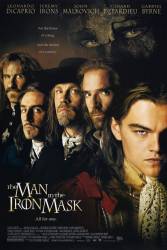Other mistake: When the Musketeers are charging the firing squad at the end, they only have about 20 yards to run which they should cover in just a couple seconds, but somehow it takes them much longer to reach the other men. This is especially noticeable since they're running at full speed. (This has nothing to do with editing or slow-motion, as most of the shots are shown in real time, at regular speed.)

The Man in the Iron Mask (1998)
1 other mistake
Directed by: Randall Wallace
Starring: Jeremy Irons, John Malkovich, Leonardo DiCaprio, Gabriel Byrne, Gerard Depardieu
Factual error: 6 years in a mask and he's able to keep that lovely babyface with just a little bit of grime, which easily comes off? Of course it would have wrecked the whole story but still...
Athos: D'Artagnan, I have never known a finer man than you nor cared more for a friend, but if this king harms my son merely to take a lover, then this king will become my enemy. And so will any man who stands between that enemy and me.
Trivia: If you look in King Louis' bedroom, there is portrait of the real King Louis XIV.
Question: I don't know anything about identical twins, so this is why I'm asking this question: how likely is it that Louis and Phillipe would have the exact same speech pattern?
Join the mailing list
Separate from membership, this is to get updates about mistakes in recent releases. Addresses are not passed on to any third party, and are used solely for direct communication from this site. You can unsubscribe at any time.
Check out the mistake & trivia books, on Kindle and in paperback.




Answer: There would be both genetic similarities and individual differences, and their vocabularies would have developed differently by education and experience. However, Phillipe was heavily tutored before the switch took place, and as "king" he would be able to distance himself (physically, mentally, and emotionally) as much as needed from members of his court until he perfected his role, along with the continued help from those in on the deception. Also, the audience and readers of the novel are expected to employ a certain "suspension of disbelief" in order to allow the story to be told.
raywest ★